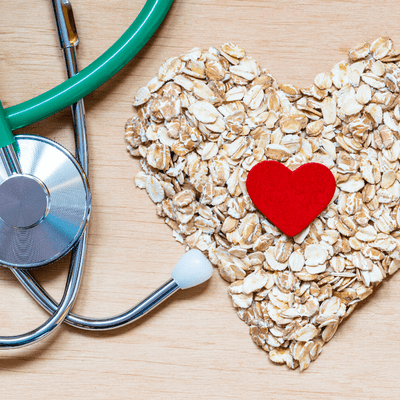4 “Functional” Foods That Can Help Lower Your Cholesterol
Functional foods are foods you can add to your diet that provide a potentially positive effect on health beyond basic nutrition. With heart disease being the leading cause of death for American adults, and high cholesterol a primary risk factor, foods that can help lower cholesterol are a smart addition to any diet.
The American Heart Association recommends getting cholesterol checked every 4-6 years for normal risk adults and more often if you have other risk factors. General recommendations are to have your cholesterol meet the following guidelines:

One of the most important steps you can take to improve your cholesterol is to follow a healthy lifestyle. Losing weight if you are overweight or obese, getting regular physical activity adding up to at least 150 minutes per week, and quitting smoking are key lifestyle changes to help improve your numbers. But what should you eat to help achieve these goals?
Generally, the American Heart Association recommends an overall healthy dietary pattern. It is encouraged to focus on filling your plates with the following types of foods:
Whole grains
Fruits and vegetables
Low-fat dairy products
Skinless poultry and fish
Nuts and legumes
Non-tropical vegetable oils
The following 4 functional foods have shown a positive effect on cholesterol numbers:
Oats: Oats contain viscous soluble fiber which gels or thickens in water and may lower LDL cholesterol. In the intestines, fiber binds to cholesterol-rich bile acids, passing them out of the body as waste rather than reabsorbing them. A dose of about 3 grams daily has been shown to help reduce cholesterol.
Soy Protein: Soybeans and soy products such as soy beverages, tofu, tempeh, and soy burgers contain soy protein and several phytonutrients that may help promote heart health. Although research can’t confirm a direct benefit between soy intake and blood cholesterol levels, there may be an indirect benefit if soy replaced foods high in saturated fats. Consuming around 25 grams of soy protein from foods, not supplements or isolated soy protein, may improve blood cholesterol levels. Certain analyses show that soy can lower LDL by 5-6%.
Nuts: When included as part of a healthy diet, nuts positively impact risk factures for cardiovascular disease, especially cholesterol levels. Although nuts are high in fat, they contain mostly healthy unsaturated fat. It is important to keep an eye on portions with nuts as their calories can add up quickly. A typical serving is around ¼ cup. The FDA has approved a Qualified Health Claim for nuts and heart disease stating that “1.5 ounces per day of most nuts as part of a diet low in saturated fat and cholesterol may reduce the risk for heart disease.”
Oily Fish: Omega-3’s from oily fish, such as salmon or tuna, may help reduce the risk of heart disease. The American Heart Association recommends eating fish at least twice weekly. Research suggests that omega-3’s may help prevent arteries from hardening, lower levels of triglycerides, and modestly reduce blood pressure levels. When fish replaces meat, which has LDL-increasing saturated fat, it can help to lower LDL cholesterol. If your triglycerides are high, omega-3’s from oily fish can help bring those numbers down as well.
Including these 4 functional foods in a diverse diet filled with lots of colorful plant foods is a great way to improve your cholesterol one bite at at time.

Interested in eating healthy? Hungry for more?








 Weight Loss
Weight Loss Health & Wellness
Health & Wellness Diabetes
Diabetes Heart Health
Heart Health Motherhood & Family
Motherhood & Family Dietary Restriction
Dietary Restriction Other Health Conditions
Other Health Conditions About SSHE
About SSHE


